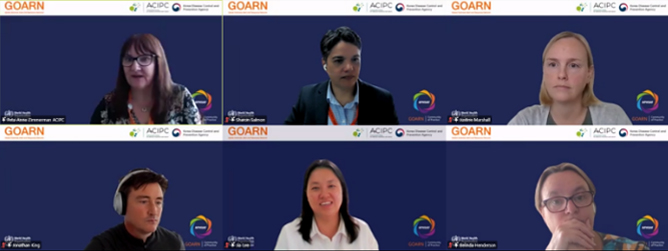
GHSCO Newsletter
September 2025
Volume2 Number3
GHSCO Updates1
Global Outbreak Alert and Response Network (GOARN) Webinar Series to Strengthen Regional Partner Engagement
Strengthening Regional Health Security Through New GOARN Webinar Series
The Korea Disease Control and Prevention Agency (KDCA), together with the Global Outbreak Alert and Response Network (GOARN) and the Australasian College for Infection Prevention and Control (ACIPC), co-hosted a new webinar series to enhance collaboration and knowledge-sharing across the Western Pacific Region.
As part of the WHO WPRO’s Asia Pacific Health Security Action Framework (APHSAF) Community of Practice (CoP), GOARN aims to sustain and strengthen partner engagement to respond to increasingly frequent and complex public health emergencies.
Building a Stronger Community of Practice
Since its establishment in 2000, GOARN has played a central role in deploying experts to support outbreak response and preparedness. With over 300 partner institutions worldwide, the network has been instrumental in addressing global infectious disease threats.
This webinar series seeks to:
- Improve understanding of the GOARN deployment process among partners and WHO.
- Share real-world field experiences from past deployments, such as the measles response in Mongolia and HIV outbreak management in Fiji.
- Strengthen connections between GOARN partners, WHO offices, and technical experts to enhance collective readiness.
First Webinar: “Deploying with GOARN”
The inaugural session, “Deploying with GOARN”, was held virtually on September 23rd, 2025. The 60-minute program featured insights from Dr. Peta-Anne Zimmerman (ACIPC), Dr. Socorro Escalante (WHO Mongolia), Belinda Henderson (Queensland Department of Health), Matthew Shortus (WHO WPRO), Dr. Jonathan King (Kirby Institute, University of New South Wales), Dr. Justine Marshall (Kirby Institute, University of New South Wales), facilitated by Dr. Sharon Salmon (WHO WPRO) and Jia Lee (KDCA) with approximately 240 participants joining from various countries and institutions.
Discussions highlighted the GOARN surge mechanism, partner onboarding, and first-hand deployment experiences, followed by an interactive Q&A session.
 GOARN Webinar Speakers
GOARN Webinar Speakers
Looking Ahead
The series designs in four webinar sessions. The second session “Powered by Partners: GOARN Collaboration Across the Region” will highlight surge capacity and strategic opportunities for collaboration. Future sessions in 2026 will further explore faculty development, mentoring, and specialized technical groups.
By providing a structured and interactive platform, the GOARN Webinar Series aims to strengthen workforce capacity, foster collaboration, and ensure the region is better prepared for future public health emergencies.